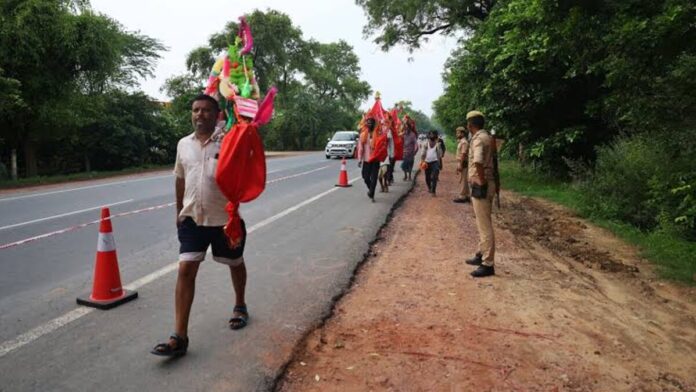The Uttar Pradesh and Uttarakhand orders requiring restaurants along the Kanwar yatra route to display the names of the owners were barred from being enforced by the Supreme Court on Monday in an interim order. However, the court did mandate that these establishments display the type of food they are selling to the Kanwariyas.
APCR, an NGO, was among the many petitions that the Supreme Court was considering that opposed the Uttarakhand and Uttar Pradesh action. The move in the two states was also contested in two further petitions that were submitted to the supreme court. Authorities in Uttarakhand and Uttar Pradesh ordered restaurants and food stands to post the identities of their proprietors last week, causing a stir.
A bench of Justices Hrishikesh Roy and S V N Bhatti sent notice to the states of Uttar Pradesh, Uttarakhand, and those with the Yatra route, saying, “We deem it appropriate to pass an interim order prohibiting the enforcement of the above directives until the returnable date having regard to the above discussion.” Stated differently, the food vendors should not be compelled to reveal the names or identities of their owners or staff, but they should be obliged to show what kind of food they are giving the Kanwariyas.
Senior counsel A M Singhvi stated there was no “rational nexus” for the action when representing a petitioner. “There is no purpose served by disclosing the names of owners and employees.” He contended that the police have issued the directions and accused them of attempting to create communal divisions.
Singhvi also argued that the directive has no statutory backing. “No law gives police commissioners the power to do it”.
While the plea filed by political commentator Apoorvanand and activist Aakar Patel sought the court’s intervention to ask the states to withdraw the orders, the petition filed by TMC MP Mahua Moitra accused the Uttar Pradesh government of “targeting Muslim-owned businesses”. In their petition, Apoorvanand and Patel said the “impugned directives encourage discrimination on grounds of caste and religion and cannot be seen to serve any ‘legitimate purpose’.”
“These directives promote discrimination solely based on religious and caste identity, as they do not require the display of food items being served or a statement that no non-vegetarian or non-satvik food is being served, but only the display of religious or caste identity explicit in one’s name,” the plea said. This, they argued, “directly breaches” Article 15 of the Constitution.
The argument stated that the guidelines encourage untouchability and jeopardise the privacy of the store owners and their staff, putting them at risk of being singled out.
In her petition, Moitra accused the Uttar Pradesh Government of creating “conditions for economic boycott of Muslims”. “Since June 2023, Respondent No 1 (State of UP) continued to empower and embolden the anti-social elements by actively targeting Muslim-owned businesses based on fabricated and malicious information circulated by the anti-social elements. The Respondent No 1, through acts of commission and omission, created conditions for the complete economic boycott of Muslim minorities on the pretext of their ‘impure’ dietary choices,” the petition said.
“In forcing the disclosure of the names of proprietors and even those of their staff, on the stated ground of respecting pilgrims’ dietary choices, makes it clear that ‘dietary choices’ is a pretext, or a proxy, for the compelled disclosure of personal — and, in this case, religious — identity, through the disclosure of names. The upshot of this is to create a socially-enforced economic boycott on Muslim shop owners and workers, and the loss of their livelihoods,” Mahua Moitra said in her plea.
According to the head of the Trinamool Congress, upholding public order is the State’s affirmative duty. She argued that in order to maintain public order, the State cannot outsource or abdicate its responsibilities by asking people to give up their right to free expression. She added that this is equivalent to caving in to the “heckler’s veto” and inverts the relationship between the State and the people.
According to Mahua Moitra’s argument, the directives unreasonably restrict the restaurant owners’ and food vendors’ ability to conduct business, violating their right to engage in any profession, trade, or business under Article 19(1)(g) of the Constitution. The orders are also manifestly arbitrary, disproportionate, and violate the right to equality, the petition said.




